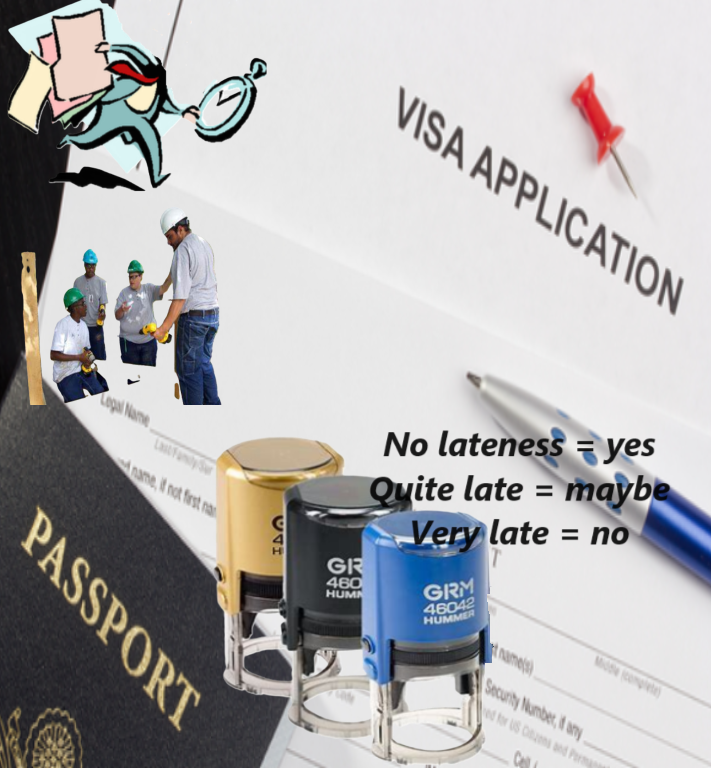Afzal, R (on the application of) v Secretary of State for the Home Department [2023] UKSC 46 (28 November 2023)
Citation:Afzal, R (on the application of) v Secretary of State for the Home Department [2023] UKSC 46 (28 November 2023)
Rule of thumb: Stare-decisis: If an immigrant on license in the UK is late paying fees & submitting work-reports, can they still get ‘indefinite leave’ to remain after a 10 year period of successfully living in the UK? If the delays are significant, no; if the delays are minor, yes. It has to be considered on a case-by-case basis & there is a grey area in the middle.
Background facts:The basic facts of this case were that Mr Azfal & Mr Lyieke were Visa-immigration licensee in the UK. Both had lived in the UK for 10 years, and had largely worked hard & been in no trouble. However, Visa licensees are supposed to pay fees & provide updates to the Home Office at various junctures. At various points they had been very late in providing fees and updates – this meant that there were therefore long periods when their activities & whereabouts were unaccounted for. The Home Office refused to provide ‘indefinite leave’ to both individuals.




Parties argued: Azfal & Lyieke both argued that they had complied with the 10 year good behaviour rule to attain ‘indefinite leave’ to remain in the UK, such they no longer had to keep providing fees & updates to the Home Office.
The Home Office argued that the significant lateness in providing updates & fees meant that this could not be said to meet the 10 year rule – they argued that this would set the wrong precedent for Visa licensees just being lax in complying with all the requirements – nobody would be motivated to comply if they thought it did not matter in their pursuit to gain ‘indefinite leave’ status, with there being long periods people were unaccounted for, and the system would not function.
Court held: The Court upheld the arguments of the Home Office. The Court stated that the forms & fees in this case were significantly late meaning that there could not be said to be 10 years of continuous lawful residence. The Court did state that the immigration rules were poorly written and the line between human error administrative mix-ups and overstaying & unlawful residence was not always clear – the Court did affirm nonetheless that these were cases which fell on the side of periods of unlawful errors which were not administrative errors.

Ratio-decidendi:
1. ‘There are two appeals before the court. In each case the appeal concerns the question whether the appellant (Mr Afzal and Mr Iyieke, respectively) is entitled to be granted indefinite leave to remain in the United Kingdom (“ILR”) by virtue of section 3C of the Immigration Act 1971 (“section 3C”), para 276B of the Immigration Rules (Statement of Changes in Immigration Rules (1994) (HC 395)) (“para 276B”) and the respondent Secretary of State’s Long Residence Policy Guidance (2016) (“the Guidance”)…
5. On 6 July 2017, before the expiry of that leave, Mr Afzal submitted an application for further leave to remain along with an application for waiver of the relevant fee. On 18 October 2017 the Secretary of State rejected Mr Afzal’s application to waive the fee and notified him that he had to pay the applicable fee together with the Immigration Health Surcharge (“the IHS”) payable pursuant to the 2015 Order. The IHS is a sum payable in respect of having access to healthcare services in the United Kingdom for the period during which the applicant is expected to remain here.
6. At the hearing Mr Zainul Jafferji, for Mr Afzal, sought to contend that Mr Afzal had not received the notice sent on 18 October 2017 requiring him to pay the fee and the IHS. However, this was not disputed in the proceedings below and the agreed statement of facts and issues for this court indicated that he had indeed been notified on 18 October 2017 that he had to pay the fee and the IHS. It is not for this court to go behind the agreed statement of facts and issues, nor is it appropriate for this court to resolve disputes on issues of fact which are raised for the first time on an appeal. Accordingly, the appeal has proceeded on the basis as set out in the agreed statement of facts and issues.
7. On 1 November 2017 Mr Afzal paid the fee for his application for leave to remain, but he omitted to pay the IHS as required. On 8 November 2017 the Secretary of State wrote to him to remind him to pay the IHS within 10 days….
10. On 28 February 2020, having resided in the United Kingdom for more than 10 years, Mr Afzal applied for ILR pursuant to para 276B on the ground of long residence here, relying so far as necessary on section 3C. On 11 March 2020 the Secretary of State refused his application on the grounds that there was a gap in his continuous lawful residence in the United Kingdom by reason of him over-staying the leave granted to him on 14 July 2014, which had expired on 14 July 2017, and only being granted fresh leave to remain on 5 September 2019…
69. In Hoque the Court of Appeal analysed para 276B(v) with care. It pointed out that it has two parts which operate in different ways. The first limb states a distinct requirement to be satisfied by an applicant for ILR on the grounds of long residence in the United Kingdom alongside those specified in subparas (i)-(iv). The second limb (“Any previous period [etc]”) does not state a requirement of that character, but instead qualifies the requirement of 10 years continuous lawful residence in subpara (i)(a). The first limb deals with a situation where there is an open-ended period of overstaying because no subsequent leave is granted. The second limb deals with a situation where there is a book-ended period of overstaying, which occurs between two periods of leave. The parties agree with this analysis of the provision.
70. The concepts of continuous residence and of lawful residence are defined in para 276A of the Immigration Rules to mean, respectively, “residence in the UK for an unbroken period” and “residence which is continuous residence pursuant to existing leave to enter or remain”. Where there is a period of overstaying without leave which is book-ended between two periods with leave, it clearly does not itself qualify as a period of residence pursuant to existing leave. Para 276B(v) and para 39E are both expressed in terms which recognise this. Both limbs of para 276B(v) refer to the relevant period as a “period of overstaying” and para 39E(2) is predicated on there being a break between periods of leave. I agree with Sir Patrick Elias (para 53) that had it been intended that there was to be any departure from such a fundamental requirement as that in para 276B(i)(a) of 10 years continuous lawful residence, this would have been indicated very clearly by express words or by plain necessary implication. But this has not been done…
91… A final comment is in order. In cases dealing with this part of the Immigration Rules, judges have repeatedly commented on their poor drafting. Poor drafting needlessly creates difficulties and uncertainties which lead to expensive litigation. It is highly desirable that the project to redraft the Immigration Rules to make them clearer should be carried forward to completion’.
Lord Sales
Warning: This is not professional legal advice. This is not professional legal education advice. Please obtain professional guidance before embarking on any legal course of action. This is just an interpretation of a Judgment by persons of legal insight & varying levels of legal specialism, experience & expertise. Please read the Judgment yourself and form your own interpretation of it with professional assistance.

